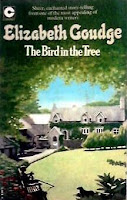 |
| (Amazon UK link) |
The book opens with Ben (aged 9) and his younger siblings Tommy and Caroline rushing out to meet their adult cousin David, who is coming to stay at the family home, Damerosehay. In a few brief word pictures the children are described: Ben - delicate and sensitive; Tommy - loud and cheerful; Caroline - dreamy and mysterious.
Lucilla, David and the children's grandmother, is focal point of the family. She brought David up after his father died from war wounds; she is now looking after her three younger grandchildren, since their parents are divorced. Their father George works in India, and their mother Nadine runs an antique shop in London. Her home (Damerosehay) is a haven of peace to the entire family, and particularly for Ben, whose health suffered from the Indian climate, and also during his parents' many fights.
David's arrival is not as relaxed as usual, and Lucilla senses it. He has a secret which he knows is going to upset the stability of the family, and which will make Lucilla distressed and angry. He worries that he may have to forfeit future visits; indeed, his grandmother might reject him entirely. He doesn't tell her his news until he has spent a night in the house, and neither of them sleep very well. When he does tell Lucilla, her reaction is worse than he expected. However she comes up with a plan - indeed, a demand - which he agrees to fulfil before making a decision about his future.
That's a summary of the early part of the book, but this isn't a plot-driven novel. It's an early version of a family saga with strong characters who interact with each other deeply. Elizabeth Goudge was a very talented author, who managed to weave something magical into her stories, drawing personalities who are clear and distinct, making each conversation entirely believable in context. She must have been a superb study of human nature.
From the opening moment when the children go to meet David, to the time when Lucilla realises that there is something badly wrong, two fairly lengthy chapters have intervened. There is no further action during these chapters: the children meet David, and come back to Damerosehay in his car. But we learn about the marshes, and where the house is set; we learn about David's father - Lucilla's favourite son - and his tragic death; we learn about how Lucilla and David discovered Damerosehay twenty years previously, and how the rest of the family rallied round to pay for it. We also read about some of the legends of the area, which might seem irrelevant padding, but which reappear later in the book with significance to the story.
'The Bird in the Tree' was first published in 1940, and is the first of three novels about the Eliots of Damerosehay. With today's fast-paced writing style, they would probably have been condensed into one book if they had been written sixty years later, and what a loss that would have been! I'm not the kind of person who usually enjoys lengthy descriptions. I'm often tempted to skip over them and get to the conversations when I'm reading a slow-moving book. But I've learned not to do this with Elizabeth Goudge. Her descriptions are masterly paintings that bring the people and places alive. She doesn't just talk about what people see, she talks about their feelings, their longings, their imagination. There's something mystical about her writing, and yet the people are so real that when I finish her novels I feel as if I'm bidding farewell to dear friends.
It's not a book to rush through, or to read when there are demands of family and home. When I was distracted once or twice while reading this, I found I would read a page or two without taking in a word. It does need concentration, and peace - perhaps because Damerosehay itself is such a haven of peace. Life moves at a gentle pace, the young moving rapidly and the old taking their time as the pattern of the years unfolds, weaving past and present together.
It's a book about integrity, and faithfulness, and being true to oneself. It asks some poignant questions about truth, and whether it's better to give in to emotion to please oneself or to deny strong feelings for the sake of the wider community. There are faint Christian undertones, and a sense that moral order is God-ordained, but only in a low-key way. The book might seem quaint, even irrelevant to modern readers, yet it makes the point that human nature doesn't change; the struggles David is experiencing were mirrored to some extent in Lucilla's own youth, fifty years previously.
I like the way that all the generations are covered, from 78-year-old Lucilla down to five-year-old Caroline, each with their own part to play. The interactions between adults and children seem healthy and positive. Inevitably there are places that seem out-of-date, such as the whole issues of servants and the general class-consciousness of the 1940s leading to formal modes of address. But given that it's based in that period, I don't find it unpleasant.
All in all, I love this book. It's not for people who like action and adventure. But if you enjoy a cosy study of human nature, and have a few hours to spare with nothing demanding your attention, I can recommend it highly.
No comments:
Post a Comment